Zidovudine the drug trial: Ethical concerns in drug trials of Zidovudine
VerifiedAdded on 2023/06/11
|8
|2732
|435
AI Summary
This essay discusses the controversy surrounding the drug trial of Zidovudine, an antiretroviral medication for HIV/AIDS, and the ethical concerns related to the use of placebo-controlled studies and informed consent in developing countries.
Contribute Materials
Your contribution can guide someone’s learning journey. Share your
documents today.
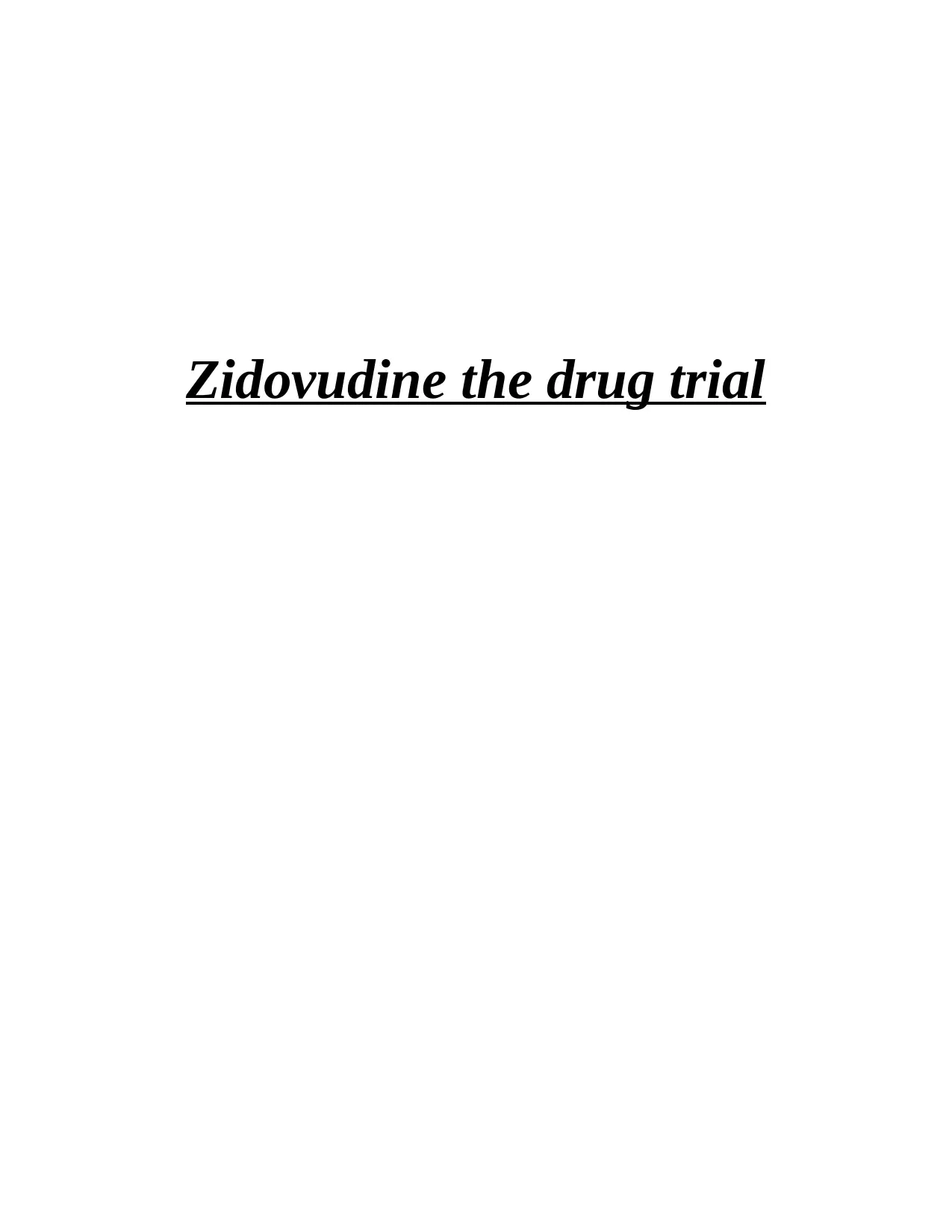
Zidovudine the drug trial
Secure Best Marks with AI Grader
Need help grading? Try our AI Grader for instant feedback on your assignments.
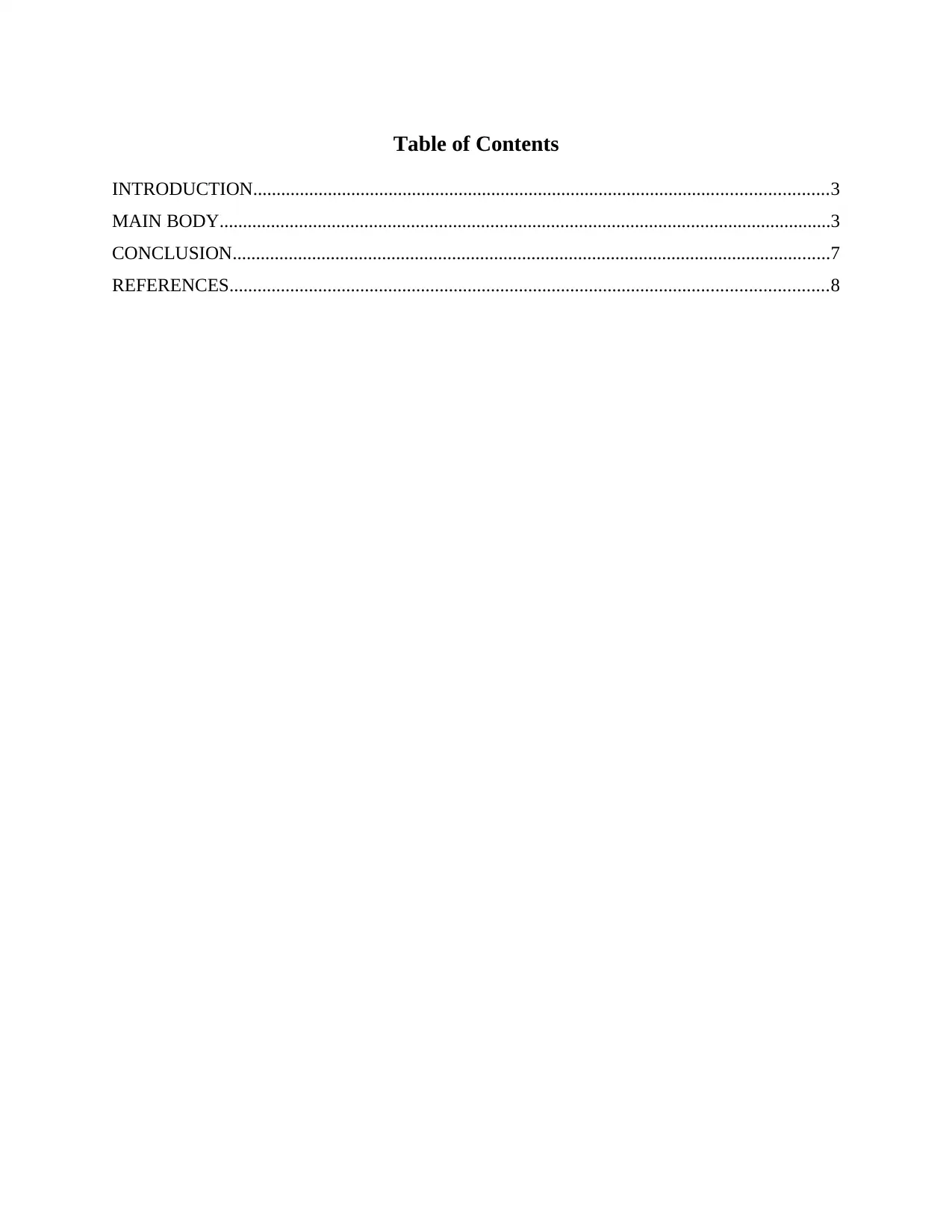
Table of Contents
INTRODUCTION...........................................................................................................................3
MAIN BODY...................................................................................................................................3
CONCLUSION................................................................................................................................7
REFERENCES................................................................................................................................8
INTRODUCTION...........................................................................................................................3
MAIN BODY...................................................................................................................................3
CONCLUSION................................................................................................................................7
REFERENCES................................................................................................................................8
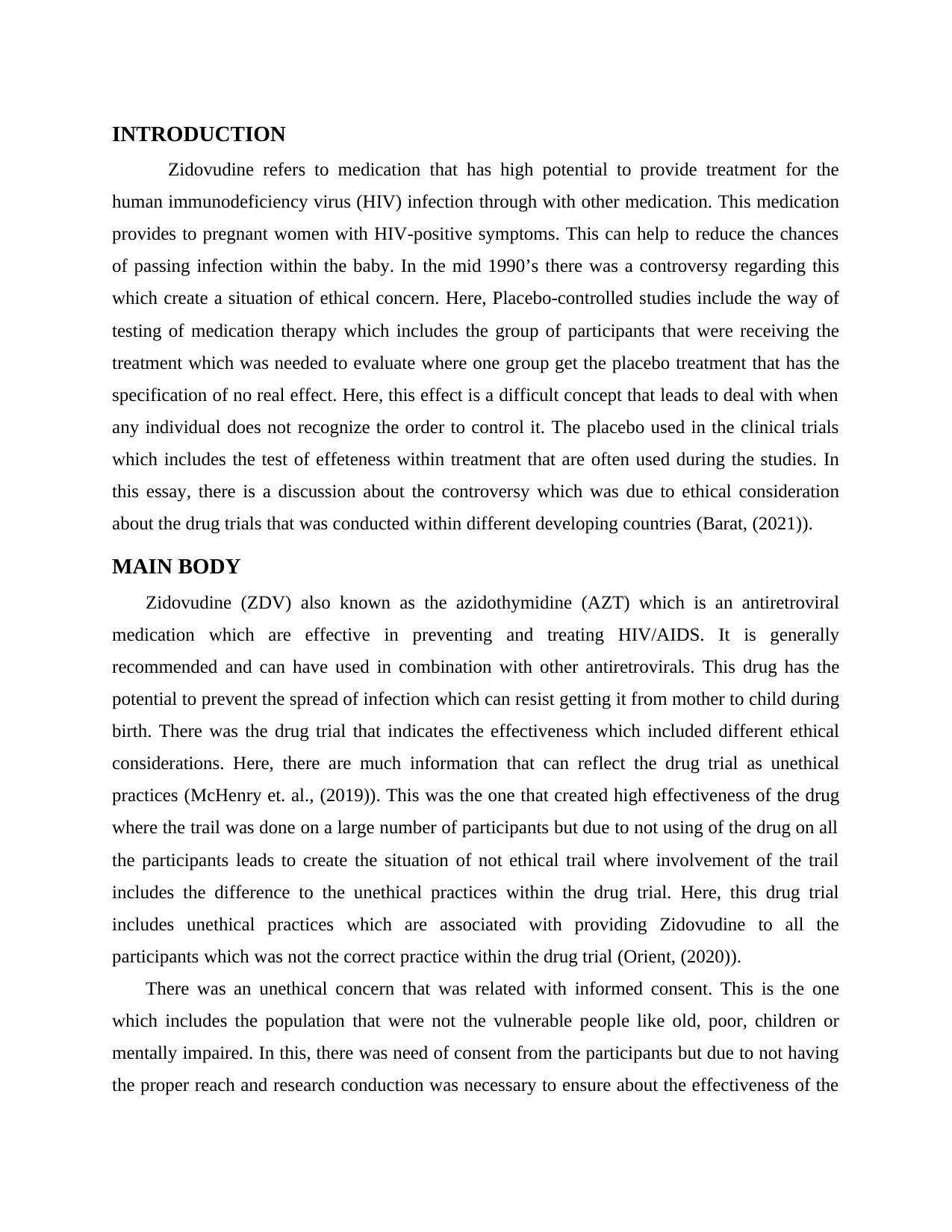
INTRODUCTION
Zidovudine refers to medication that has high potential to provide treatment for the
human immunodeficiency virus (HIV) infection through with other medication. This medication
provides to pregnant women with HIV-positive symptoms. This can help to reduce the chances
of passing infection within the baby. In the mid 1990’s there was a controversy regarding this
which create a situation of ethical concern. Here, Placebo-controlled studies include the way of
testing of medication therapy which includes the group of participants that were receiving the
treatment which was needed to evaluate where one group get the placebo treatment that has the
specification of no real effect. Here, this effect is a difficult concept that leads to deal with when
any individual does not recognize the order to control it. The placebo used in the clinical trials
which includes the test of effeteness within treatment that are often used during the studies. In
this essay, there is a discussion about the controversy which was due to ethical consideration
about the drug trials that was conducted within different developing countries (Barat, (2021)).
MAIN BODY
Zidovudine (ZDV) also known as the azidothymidine (AZT) which is an antiretroviral
medication which are effective in preventing and treating HIV/AIDS. It is generally
recommended and can have used in combination with other antiretrovirals. This drug has the
potential to prevent the spread of infection which can resist getting it from mother to child during
birth. There was the drug trial that indicates the effectiveness which included different ethical
considerations. Here, there are much information that can reflect the drug trial as unethical
practices (McHenry et. al., (2019)). This was the one that created high effectiveness of the drug
where the trail was done on a large number of participants but due to not using of the drug on all
the participants leads to create the situation of not ethical trail where involvement of the trail
includes the difference to the unethical practices within the drug trial. Here, this drug trial
includes unethical practices which are associated with providing Zidovudine to all the
participants which was not the correct practice within the drug trial (Orient, (2020)).
There was an unethical concern that was related with informed consent. This is the one
which includes the population that were not the vulnerable people like old, poor, children or
mentally impaired. In this, there was need of consent from the participants but due to not having
the proper reach and research conduction was necessary to ensure about the effectiveness of the
Zidovudine refers to medication that has high potential to provide treatment for the
human immunodeficiency virus (HIV) infection through with other medication. This medication
provides to pregnant women with HIV-positive symptoms. This can help to reduce the chances
of passing infection within the baby. In the mid 1990’s there was a controversy regarding this
which create a situation of ethical concern. Here, Placebo-controlled studies include the way of
testing of medication therapy which includes the group of participants that were receiving the
treatment which was needed to evaluate where one group get the placebo treatment that has the
specification of no real effect. Here, this effect is a difficult concept that leads to deal with when
any individual does not recognize the order to control it. The placebo used in the clinical trials
which includes the test of effeteness within treatment that are often used during the studies. In
this essay, there is a discussion about the controversy which was due to ethical consideration
about the drug trials that was conducted within different developing countries (Barat, (2021)).
MAIN BODY
Zidovudine (ZDV) also known as the azidothymidine (AZT) which is an antiretroviral
medication which are effective in preventing and treating HIV/AIDS. It is generally
recommended and can have used in combination with other antiretrovirals. This drug has the
potential to prevent the spread of infection which can resist getting it from mother to child during
birth. There was the drug trial that indicates the effectiveness which included different ethical
considerations. Here, there are much information that can reflect the drug trial as unethical
practices (McHenry et. al., (2019)). This was the one that created high effectiveness of the drug
where the trail was done on a large number of participants but due to not using of the drug on all
the participants leads to create the situation of not ethical trail where involvement of the trail
includes the difference to the unethical practices within the drug trial. Here, this drug trial
includes unethical practices which are associated with providing Zidovudine to all the
participants which was not the correct practice within the drug trial (Orient, (2020)).
There was an unethical concern that was related with informed consent. This is the one
which includes the population that were not the vulnerable people like old, poor, children or
mentally impaired. In this, there was need of consent from the participants but due to not having
the proper reach and research conduction was necessary to ensure about the effectiveness of the
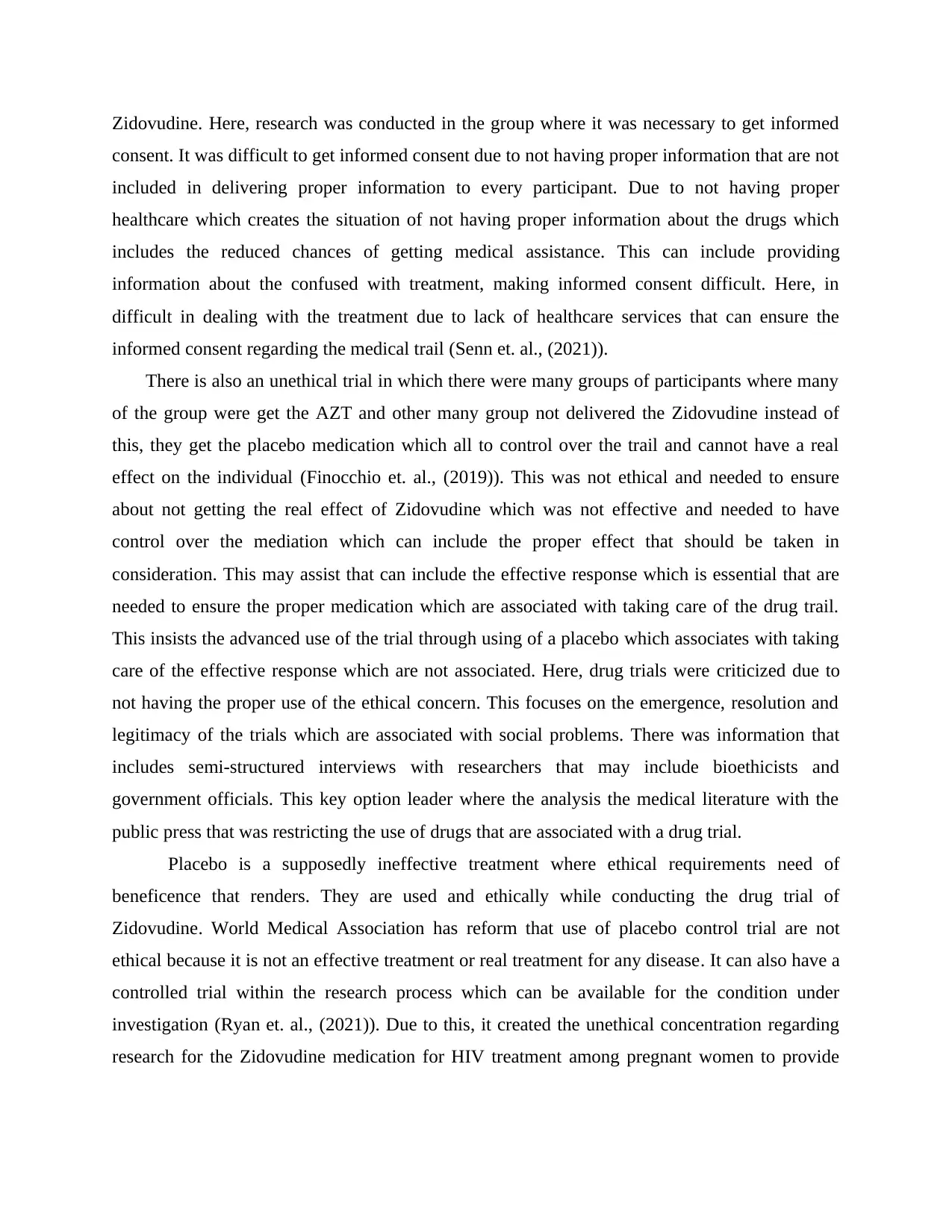
Zidovudine. Here, research was conducted in the group where it was necessary to get informed
consent. It was difficult to get informed consent due to not having proper information that are not
included in delivering proper information to every participant. Due to not having proper
healthcare which creates the situation of not having proper information about the drugs which
includes the reduced chances of getting medical assistance. This can include providing
information about the confused with treatment, making informed consent difficult. Here, in
difficult in dealing with the treatment due to lack of healthcare services that can ensure the
informed consent regarding the medical trail (Senn et. al., (2021)).
There is also an unethical trial in which there were many groups of participants where many
of the group were get the AZT and other many group not delivered the Zidovudine instead of
this, they get the placebo medication which all to control over the trail and cannot have a real
effect on the individual (Finocchio et. al., (2019)). This was not ethical and needed to ensure
about not getting the real effect of Zidovudine which was not effective and needed to have
control over the mediation which can include the proper effect that should be taken in
consideration. This may assist that can include the effective response which is essential that are
needed to ensure the proper medication which are associated with taking care of the drug trail.
This insists the advanced use of the trial through using of a placebo which associates with taking
care of the effective response which are not associated. Here, drug trials were criticized due to
not having the proper use of the ethical concern. This focuses on the emergence, resolution and
legitimacy of the trials which are associated with social problems. There was information that
includes semi-structured interviews with researchers that may include bioethicists and
government officials. This key option leader where the analysis the medical literature with the
public press that was restricting the use of drugs that are associated with a drug trial.
Placebo is a supposedly ineffective treatment where ethical requirements need of
beneficence that renders. They are used and ethically while conducting the drug trial of
Zidovudine. World Medical Association has reform that use of placebo control trial are not
ethical because it is not an effective treatment or real treatment for any disease. It can also have a
controlled trial within the research process which can be available for the condition under
investigation (Ryan et. al., (2021)). Due to this, it created the unethical concentration regarding
research for the Zidovudine medication for HIV treatment among pregnant women to provide
consent. It was difficult to get informed consent due to not having proper information that are not
included in delivering proper information to every participant. Due to not having proper
healthcare which creates the situation of not having proper information about the drugs which
includes the reduced chances of getting medical assistance. This can include providing
information about the confused with treatment, making informed consent difficult. Here, in
difficult in dealing with the treatment due to lack of healthcare services that can ensure the
informed consent regarding the medical trail (Senn et. al., (2021)).
There is also an unethical trial in which there were many groups of participants where many
of the group were get the AZT and other many group not delivered the Zidovudine instead of
this, they get the placebo medication which all to control over the trail and cannot have a real
effect on the individual (Finocchio et. al., (2019)). This was not ethical and needed to ensure
about not getting the real effect of Zidovudine which was not effective and needed to have
control over the mediation which can include the proper effect that should be taken in
consideration. This may assist that can include the effective response which is essential that are
needed to ensure the proper medication which are associated with taking care of the drug trail.
This insists the advanced use of the trial through using of a placebo which associates with taking
care of the effective response which are not associated. Here, drug trials were criticized due to
not having the proper use of the ethical concern. This focuses on the emergence, resolution and
legitimacy of the trials which are associated with social problems. There was information that
includes semi-structured interviews with researchers that may include bioethicists and
government officials. This key option leader where the analysis the medical literature with the
public press that was restricting the use of drugs that are associated with a drug trial.
Placebo is a supposedly ineffective treatment where ethical requirements need of
beneficence that renders. They are used and ethically while conducting the drug trial of
Zidovudine. World Medical Association has reform that use of placebo control trial are not
ethical because it is not an effective treatment or real treatment for any disease. It can also have a
controlled trial within the research process which can be available for the condition under
investigation (Ryan et. al., (2021)). Due to this, it created the unethical concentration regarding
research for the Zidovudine medication for HIV treatment among pregnant women to provide
Secure Best Marks with AI Grader
Need help grading? Try our AI Grader for instant feedback on your assignments.
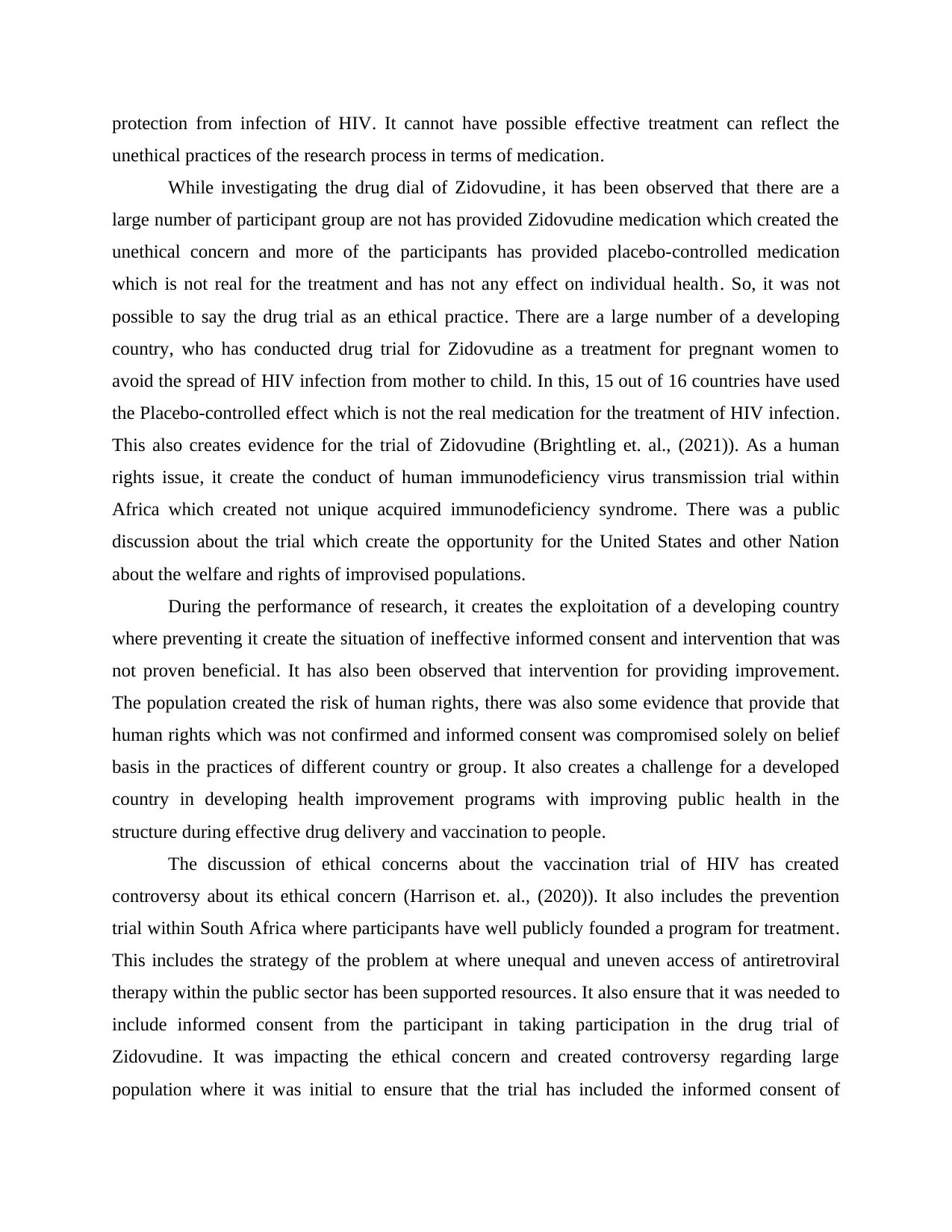
protection from infection of HIV. It cannot have possible effective treatment can reflect the
unethical practices of the research process in terms of medication.
While investigating the drug dial of Zidovudine, it has been observed that there are a
large number of participant group are not has provided Zidovudine medication which created the
unethical concern and more of the participants has provided placebo-controlled medication
which is not real for the treatment and has not any effect on individual health. So, it was not
possible to say the drug trial as an ethical practice. There are a large number of a developing
country, who has conducted drug trial for Zidovudine as a treatment for pregnant women to
avoid the spread of HIV infection from mother to child. In this, 15 out of 16 countries have used
the Placebo-controlled effect which is not the real medication for the treatment of HIV infection.
This also creates evidence for the trial of Zidovudine (Brightling et. al., (2021)). As a human
rights issue, it create the conduct of human immunodeficiency virus transmission trial within
Africa which created not unique acquired immunodeficiency syndrome. There was a public
discussion about the trial which create the opportunity for the United States and other Nation
about the welfare and rights of improvised populations.
During the performance of research, it creates the exploitation of a developing country
where preventing it create the situation of ineffective informed consent and intervention that was
not proven beneficial. It has also been observed that intervention for providing improvement.
The population created the risk of human rights, there was also some evidence that provide that
human rights which was not confirmed and informed consent was compromised solely on belief
basis in the practices of different country or group. It also creates a challenge for a developed
country in developing health improvement programs with improving public health in the
structure during effective drug delivery and vaccination to people.
The discussion of ethical concerns about the vaccination trial of HIV has created
controversy about its ethical concern (Harrison et. al., (2020)). It also includes the prevention
trial within South Africa where participants have well publicly founded a program for treatment.
This includes the strategy of the problem at where unequal and uneven access of antiretroviral
therapy within the public sector has been supported resources. It also ensure that it was needed to
include informed consent from the participant in taking participation in the drug trial of
Zidovudine. It was impacting the ethical concern and created controversy regarding large
population where it was initial to ensure that the trial has included the informed consent of
unethical practices of the research process in terms of medication.
While investigating the drug dial of Zidovudine, it has been observed that there are a
large number of participant group are not has provided Zidovudine medication which created the
unethical concern and more of the participants has provided placebo-controlled medication
which is not real for the treatment and has not any effect on individual health. So, it was not
possible to say the drug trial as an ethical practice. There are a large number of a developing
country, who has conducted drug trial for Zidovudine as a treatment for pregnant women to
avoid the spread of HIV infection from mother to child. In this, 15 out of 16 countries have used
the Placebo-controlled effect which is not the real medication for the treatment of HIV infection.
This also creates evidence for the trial of Zidovudine (Brightling et. al., (2021)). As a human
rights issue, it create the conduct of human immunodeficiency virus transmission trial within
Africa which created not unique acquired immunodeficiency syndrome. There was a public
discussion about the trial which create the opportunity for the United States and other Nation
about the welfare and rights of improvised populations.
During the performance of research, it creates the exploitation of a developing country
where preventing it create the situation of ineffective informed consent and intervention that was
not proven beneficial. It has also been observed that intervention for providing improvement.
The population created the risk of human rights, there was also some evidence that provide that
human rights which was not confirmed and informed consent was compromised solely on belief
basis in the practices of different country or group. It also creates a challenge for a developed
country in developing health improvement programs with improving public health in the
structure during effective drug delivery and vaccination to people.
The discussion of ethical concerns about the vaccination trial of HIV has created
controversy about its ethical concern (Harrison et. al., (2020)). It also includes the prevention
trial within South Africa where participants have well publicly founded a program for treatment.
This includes the strategy of the problem at where unequal and uneven access of antiretroviral
therapy within the public sector has been supported resources. It also ensure that it was needed to
include informed consent from the participant in taking participation in the drug trial of
Zidovudine. It was impacting the ethical concern and created controversy regarding large
population where it was initial to ensure that the trial has included the informed consent of
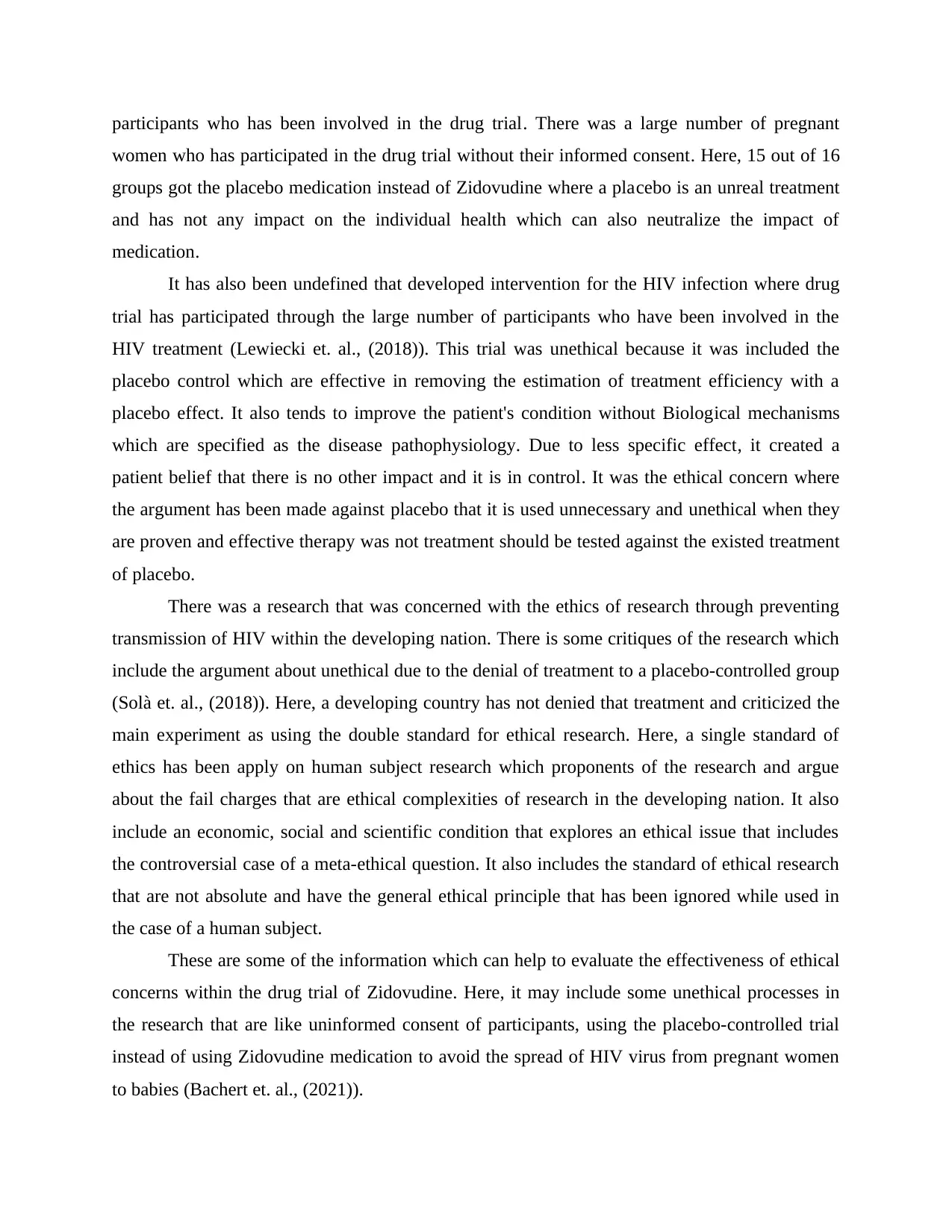
participants who has been involved in the drug trial. There was a large number of pregnant
women who has participated in the drug trial without their informed consent. Here, 15 out of 16
groups got the placebo medication instead of Zidovudine where a placebo is an unreal treatment
and has not any impact on the individual health which can also neutralize the impact of
medication.
It has also been undefined that developed intervention for the HIV infection where drug
trial has participated through the large number of participants who have been involved in the
HIV treatment (Lewiecki et. al., (2018)). This trial was unethical because it was included the
placebo control which are effective in removing the estimation of treatment efficiency with a
placebo effect. It also tends to improve the patient's condition without Biological mechanisms
which are specified as the disease pathophysiology. Due to less specific effect, it created a
patient belief that there is no other impact and it is in control. It was the ethical concern where
the argument has been made against placebo that it is used unnecessary and unethical when they
are proven and effective therapy was not treatment should be tested against the existed treatment
of placebo.
There was a research that was concerned with the ethics of research through preventing
transmission of HIV within the developing nation. There is some critiques of the research which
include the argument about unethical due to the denial of treatment to a placebo-controlled group
(Solà et. al., (2018)). Here, a developing country has not denied that treatment and criticized the
main experiment as using the double standard for ethical research. Here, a single standard of
ethics has been apply on human subject research which proponents of the research and argue
about the fail charges that are ethical complexities of research in the developing nation. It also
include an economic, social and scientific condition that explores an ethical issue that includes
the controversial case of a meta-ethical question. It also includes the standard of ethical research
that are not absolute and have the general ethical principle that has been ignored while used in
the case of a human subject.
These are some of the information which can help to evaluate the effectiveness of ethical
concerns within the drug trial of Zidovudine. Here, it may include some unethical processes in
the research that are like uninformed consent of participants, using the placebo-controlled trial
instead of using Zidovudine medication to avoid the spread of HIV virus from pregnant women
to babies (Bachert et. al., (2021)).
women who has participated in the drug trial without their informed consent. Here, 15 out of 16
groups got the placebo medication instead of Zidovudine where a placebo is an unreal treatment
and has not any impact on the individual health which can also neutralize the impact of
medication.
It has also been undefined that developed intervention for the HIV infection where drug
trial has participated through the large number of participants who have been involved in the
HIV treatment (Lewiecki et. al., (2018)). This trial was unethical because it was included the
placebo control which are effective in removing the estimation of treatment efficiency with a
placebo effect. It also tends to improve the patient's condition without Biological mechanisms
which are specified as the disease pathophysiology. Due to less specific effect, it created a
patient belief that there is no other impact and it is in control. It was the ethical concern where
the argument has been made against placebo that it is used unnecessary and unethical when they
are proven and effective therapy was not treatment should be tested against the existed treatment
of placebo.
There was a research that was concerned with the ethics of research through preventing
transmission of HIV within the developing nation. There is some critiques of the research which
include the argument about unethical due to the denial of treatment to a placebo-controlled group
(Solà et. al., (2018)). Here, a developing country has not denied that treatment and criticized the
main experiment as using the double standard for ethical research. Here, a single standard of
ethics has been apply on human subject research which proponents of the research and argue
about the fail charges that are ethical complexities of research in the developing nation. It also
include an economic, social and scientific condition that explores an ethical issue that includes
the controversial case of a meta-ethical question. It also includes the standard of ethical research
that are not absolute and have the general ethical principle that has been ignored while used in
the case of a human subject.
These are some of the information which can help to evaluate the effectiveness of ethical
concerns within the drug trial of Zidovudine. Here, it may include some unethical processes in
the research that are like uninformed consent of participants, using the placebo-controlled trial
instead of using Zidovudine medication to avoid the spread of HIV virus from pregnant women
to babies (Bachert et. al., (2021)).
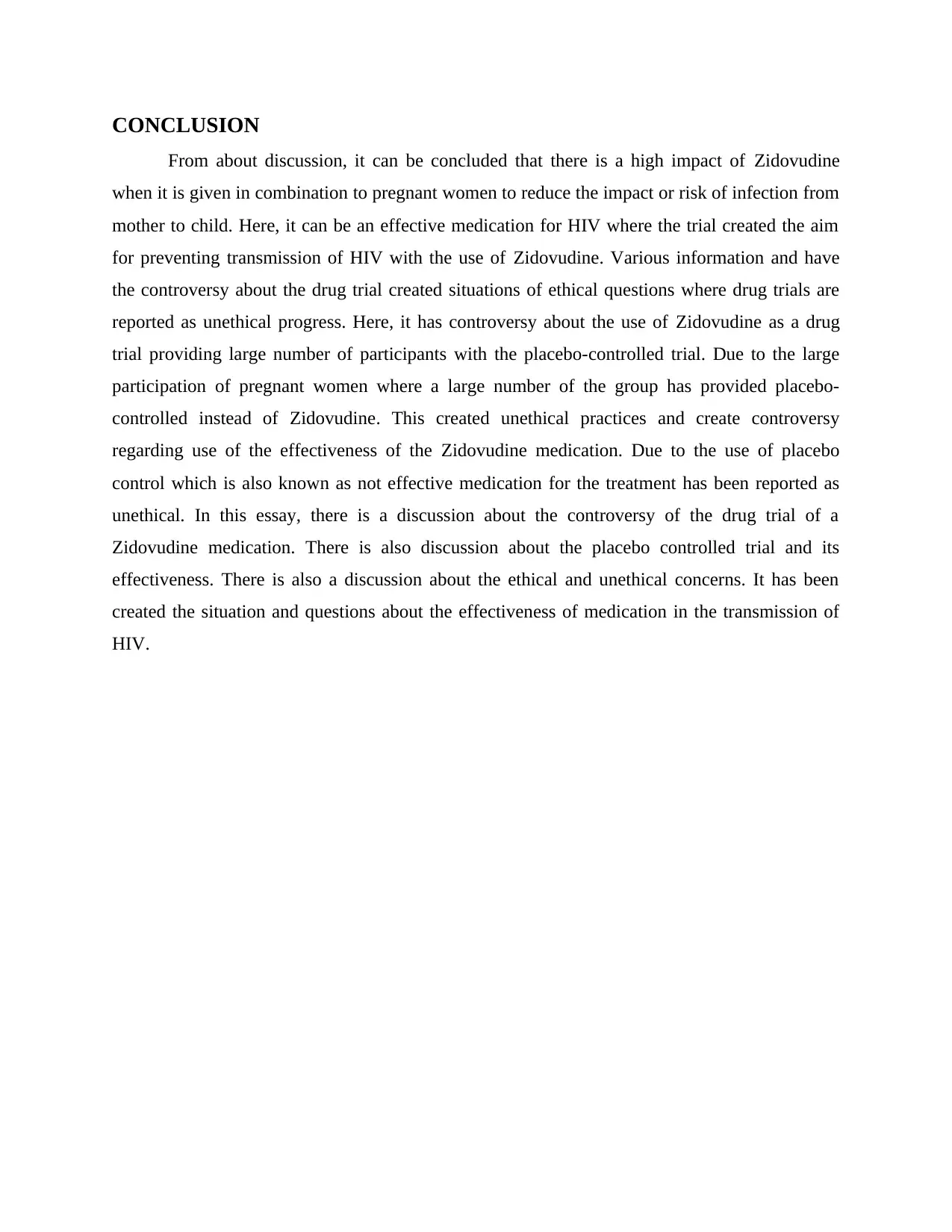
CONCLUSION
From about discussion, it can be concluded that there is a high impact of Zidovudine
when it is given in combination to pregnant women to reduce the impact or risk of infection from
mother to child. Here, it can be an effective medication for HIV where the trial created the aim
for preventing transmission of HIV with the use of Zidovudine. Various information and have
the controversy about the drug trial created situations of ethical questions where drug trials are
reported as unethical progress. Here, it has controversy about the use of Zidovudine as a drug
trial providing large number of participants with the placebo-controlled trial. Due to the large
participation of pregnant women where a large number of the group has provided placebo-
controlled instead of Zidovudine. This created unethical practices and create controversy
regarding use of the effectiveness of the Zidovudine medication. Due to the use of placebo
control which is also known as not effective medication for the treatment has been reported as
unethical. In this essay, there is a discussion about the controversy of the drug trial of a
Zidovudine medication. There is also discussion about the placebo controlled trial and its
effectiveness. There is also a discussion about the ethical and unethical concerns. It has been
created the situation and questions about the effectiveness of medication in the transmission of
HIV.
From about discussion, it can be concluded that there is a high impact of Zidovudine
when it is given in combination to pregnant women to reduce the impact or risk of infection from
mother to child. Here, it can be an effective medication for HIV where the trial created the aim
for preventing transmission of HIV with the use of Zidovudine. Various information and have
the controversy about the drug trial created situations of ethical questions where drug trials are
reported as unethical progress. Here, it has controversy about the use of Zidovudine as a drug
trial providing large number of participants with the placebo-controlled trial. Due to the large
participation of pregnant women where a large number of the group has provided placebo-
controlled instead of Zidovudine. This created unethical practices and create controversy
regarding use of the effectiveness of the Zidovudine medication. Due to the use of placebo
control which is also known as not effective medication for the treatment has been reported as
unethical. In this essay, there is a discussion about the controversy of the drug trial of a
Zidovudine medication. There is also discussion about the placebo controlled trial and its
effectiveness. There is also a discussion about the ethical and unethical concerns. It has been
created the situation and questions about the effectiveness of medication in the transmission of
HIV.
Paraphrase This Document
Need a fresh take? Get an instant paraphrase of this document with our AI Paraphraser
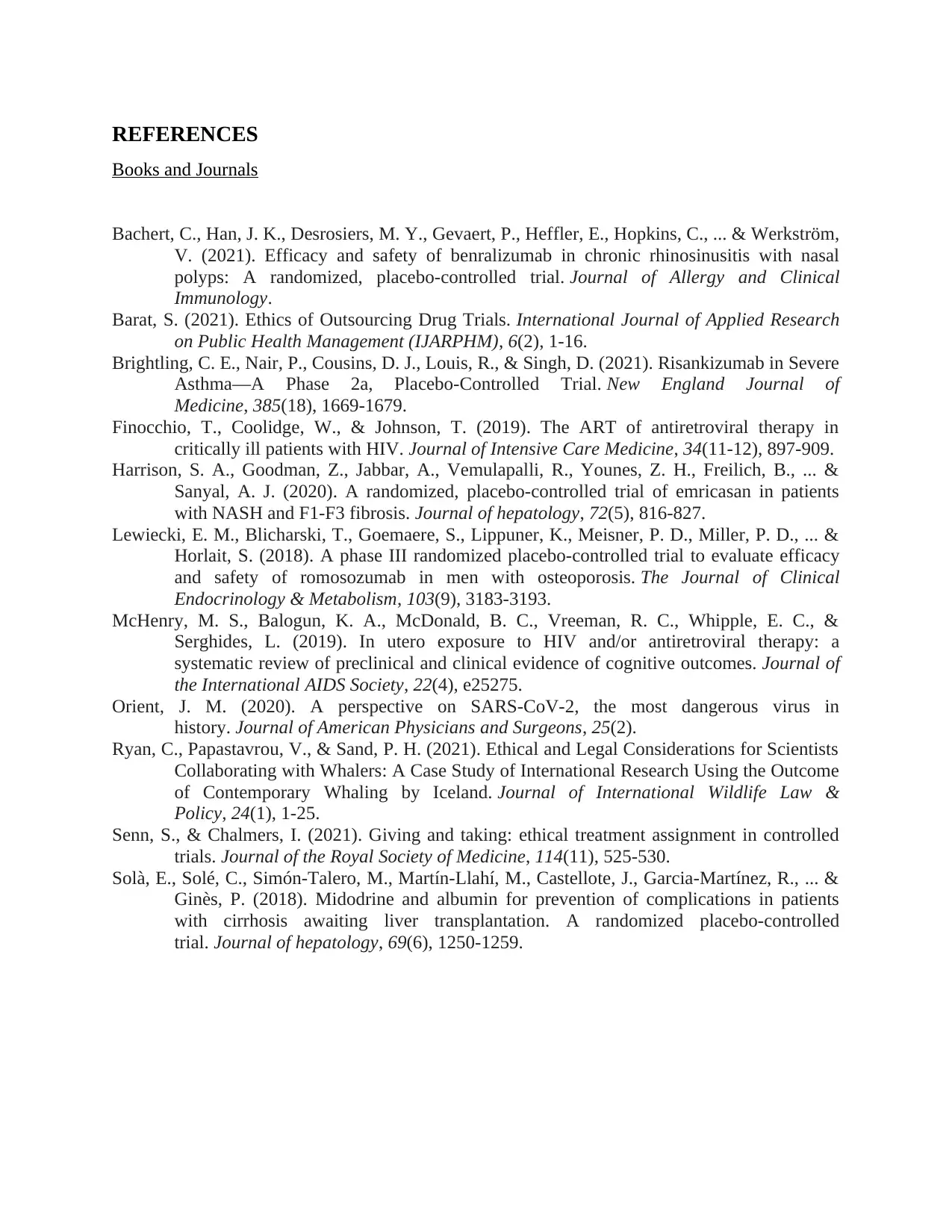
REFERENCES
Books and Journals
Bachert, C., Han, J. K., Desrosiers, M. Y., Gevaert, P., Heffler, E., Hopkins, C., ... & Werkström,
V. (2021). Efficacy and safety of benralizumab in chronic rhinosinusitis with nasal
polyps: A randomized, placebo-controlled trial. Journal of Allergy and Clinical
Immunology.
Barat, S. (2021). Ethics of Outsourcing Drug Trials. International Journal of Applied Research
on Public Health Management (IJARPHM), 6(2), 1-16.
Brightling, C. E., Nair, P., Cousins, D. J., Louis, R., & Singh, D. (2021). Risankizumab in Severe
Asthma—A Phase 2a, Placebo-Controlled Trial. New England Journal of
Medicine, 385(18), 1669-1679.
Finocchio, T., Coolidge, W., & Johnson, T. (2019). The ART of antiretroviral therapy in
critically ill patients with HIV. Journal of Intensive Care Medicine, 34(11-12), 897-909.
Harrison, S. A., Goodman, Z., Jabbar, A., Vemulapalli, R., Younes, Z. H., Freilich, B., ... &
Sanyal, A. J. (2020). A randomized, placebo-controlled trial of emricasan in patients
with NASH and F1-F3 fibrosis. Journal of hepatology, 72(5), 816-827.
Lewiecki, E. M., Blicharski, T., Goemaere, S., Lippuner, K., Meisner, P. D., Miller, P. D., ... &
Horlait, S. (2018). A phase III randomized placebo-controlled trial to evaluate efficacy
and safety of romosozumab in men with osteoporosis. The Journal of Clinical
Endocrinology & Metabolism, 103(9), 3183-3193.
McHenry, M. S., Balogun, K. A., McDonald, B. C., Vreeman, R. C., Whipple, E. C., &
Serghides, L. (2019). In utero exposure to HIV and/or antiretroviral therapy: a
systematic review of preclinical and clinical evidence of cognitive outcomes. Journal of
the International AIDS Society, 22(4), e25275.
Orient, J. M. (2020). A perspective on SARS-CoV-2, the most dangerous virus in
history. Journal of American Physicians and Surgeons, 25(2).
Ryan, C., Papastavrou, V., & Sand, P. H. (2021). Ethical and Legal Considerations for Scientists
Collaborating with Whalers: A Case Study of International Research Using the Outcome
of Contemporary Whaling by Iceland. Journal of International Wildlife Law &
Policy, 24(1), 1-25.
Senn, S., & Chalmers, I. (2021). Giving and taking: ethical treatment assignment in controlled
trials. Journal of the Royal Society of Medicine, 114(11), 525-530.
Solà, E., Solé, C., Simón-Talero, M., Martín-Llahí, M., Castellote, J., Garcia-Martínez, R., ... &
Ginès, P. (2018). Midodrine and albumin for prevention of complications in patients
with cirrhosis awaiting liver transplantation. A randomized placebo-controlled
trial. Journal of hepatology, 69(6), 1250-1259.
Books and Journals
Bachert, C., Han, J. K., Desrosiers, M. Y., Gevaert, P., Heffler, E., Hopkins, C., ... & Werkström,
V. (2021). Efficacy and safety of benralizumab in chronic rhinosinusitis with nasal
polyps: A randomized, placebo-controlled trial. Journal of Allergy and Clinical
Immunology.
Barat, S. (2021). Ethics of Outsourcing Drug Trials. International Journal of Applied Research
on Public Health Management (IJARPHM), 6(2), 1-16.
Brightling, C. E., Nair, P., Cousins, D. J., Louis, R., & Singh, D. (2021). Risankizumab in Severe
Asthma—A Phase 2a, Placebo-Controlled Trial. New England Journal of
Medicine, 385(18), 1669-1679.
Finocchio, T., Coolidge, W., & Johnson, T. (2019). The ART of antiretroviral therapy in
critically ill patients with HIV. Journal of Intensive Care Medicine, 34(11-12), 897-909.
Harrison, S. A., Goodman, Z., Jabbar, A., Vemulapalli, R., Younes, Z. H., Freilich, B., ... &
Sanyal, A. J. (2020). A randomized, placebo-controlled trial of emricasan in patients
with NASH and F1-F3 fibrosis. Journal of hepatology, 72(5), 816-827.
Lewiecki, E. M., Blicharski, T., Goemaere, S., Lippuner, K., Meisner, P. D., Miller, P. D., ... &
Horlait, S. (2018). A phase III randomized placebo-controlled trial to evaluate efficacy
and safety of romosozumab in men with osteoporosis. The Journal of Clinical
Endocrinology & Metabolism, 103(9), 3183-3193.
McHenry, M. S., Balogun, K. A., McDonald, B. C., Vreeman, R. C., Whipple, E. C., &
Serghides, L. (2019). In utero exposure to HIV and/or antiretroviral therapy: a
systematic review of preclinical and clinical evidence of cognitive outcomes. Journal of
the International AIDS Society, 22(4), e25275.
Orient, J. M. (2020). A perspective on SARS-CoV-2, the most dangerous virus in
history. Journal of American Physicians and Surgeons, 25(2).
Ryan, C., Papastavrou, V., & Sand, P. H. (2021). Ethical and Legal Considerations for Scientists
Collaborating with Whalers: A Case Study of International Research Using the Outcome
of Contemporary Whaling by Iceland. Journal of International Wildlife Law &
Policy, 24(1), 1-25.
Senn, S., & Chalmers, I. (2021). Giving and taking: ethical treatment assignment in controlled
trials. Journal of the Royal Society of Medicine, 114(11), 525-530.
Solà, E., Solé, C., Simón-Talero, M., Martín-Llahí, M., Castellote, J., Garcia-Martínez, R., ... &
Ginès, P. (2018). Midodrine and albumin for prevention of complications in patients
with cirrhosis awaiting liver transplantation. A randomized placebo-controlled
trial. Journal of hepatology, 69(6), 1250-1259.
1 out of 8
Related Documents
Your All-in-One AI-Powered Toolkit for Academic Success.
+13062052269
info@desklib.com
Available 24*7 on WhatsApp / Email
![[object Object]](/_next/static/media/star-bottom.7253800d.svg)
Unlock your academic potential
© 2024 | Zucol Services PVT LTD | All rights reserved.




